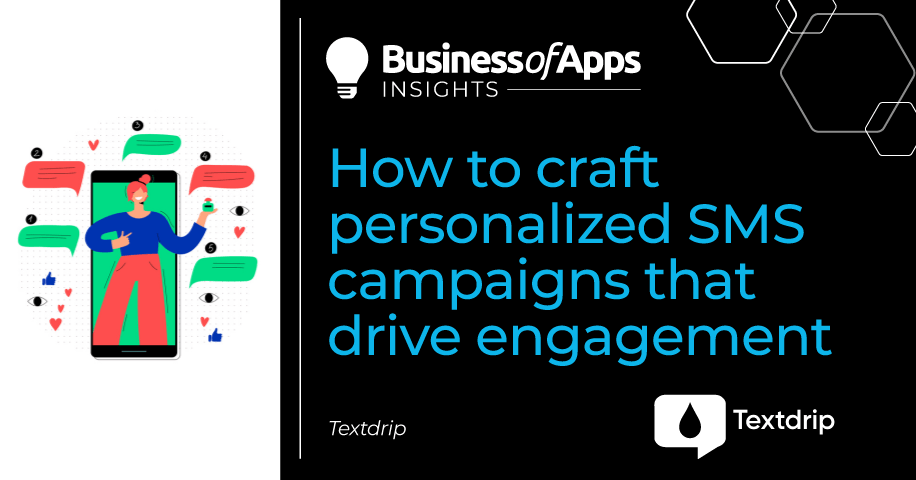Have you received a message from a brand that felt it was meant just for you? Did you notice the personalization level of that message?
Personalization has gone beyond just adding the recipient’s name in the SMS or emails you plan to send. It has become more data-driven to allow you to tailor each interaction with your customers or prospects based on their preferences and behavior.
In this article, we’ll delve into crafting personalized SMS campaigns to increase customer engagement. But first, let’s understand what is personalized SMS marketing.
What is personalized SMS marketing?
Personalization is a marketing strategy where brands use customer data available to them to tailor their SMS marketing campaigns. Personalized SMS messages go beyond just addressing customers by their name and include information to create a truly unique and tailored experience.
The goal of sending personalized SMS campaigns is to connect and build relationships with your prospects or customers, drive user engagement, and boost sales and revenue. The idea is simple: use the available data about the customers or prospects to create personalized interactions.
For example, you can use their name, date of birth, purchase history, interests, preferences, and other data to offer personalized deals and recommendations. By crafting personalized and relevant messages, you can enhance customer experience and engagement with your brand.
However, brands should ensure that they use customer data ethically and responsibly and not invade the privacy of their customers. Overall, whether you want to send personalized offers, recommendations, updates, or others, SMS has the potential to craft unique and engaging experiences.
Why use personalized SMS to drive engagement?
The biggest benefit of SMS is that 94% of people open and read the most text messages they receive. Also, 81% of US consumers are comfortable opening an SMS from a business, and helps brands generate 10 to 20-fold ROI.
Around 56% of consumers said in a survey that they will become repeat buyers after a personalized experience. Additionally, the same survey found that 69% of business leaders are planning to increase their investment in personalization. AI is also playing a pivotal role as 9 out of 10 businesses are using AI-driven personalization to drive growth.
What sets personalized SMS apart from the rest is its immediacy, high open and response rate, effectiveness for bulk promotions, best CTR, and high cost-efficiency. SMS is a great way to deliver value and time-sensitive information or promotions, like flash sales to their recipients.
Moreover, SMS messages are simple, short, and to the point which forces businesses to be strategic and focus on delivering value through text messages that resonate with their audience. While SMS has some limitations, it can be highly effective for businesses to drive engagement and build strong relationships.
How to craft personalized SMS campaigns for high engagement
Here are some effective strategies to craft personalized SMS campaigns for high engagement:
Use the recipient’s name
Include your customer’s name in the SMS to make it feel more personal and relevant. Doing so shows that you have taken the time to address them individually and can help create a stronger connection with your audience.
Segmentation of your audience
Segmentation involves dividing your audience into different groups based on specific criteria such as location, age, demographics, gender, preferences, and businesses. This allows you to send messages that are tailored to each group’s interests and needs, increasing the likelihood of engagement.
Creating targeted campaigns
Targeted campaigns are based on the idea of sending messages that are relevant to the recipient’s past behavior or preferences. For example, if a customer has purchased a shirt from your store, you could send them a special offer on ties or accessories that complement the shirt. This can encourage repeat purchases and increase customer loyalty.
Personalizing the opt-in process
Personalizing the opt-in process involves giving customers the ability to choose what type of messages they receive and how often they receive them. This allows you to send messages that are more likely to be relevant and valuable to the recipient, increasing engagement and reducing the likelihood of them opting out.
Sending follow-up messages
Follow-up messages can be used to thank customers for their business, offer recommendations based on their past purchase history, or provide updates on new products or promotions. This can help keep your brand on top of the minds of customers and encourage repeat business.
Make use of SMS surveys
SMS surveys are a great way to gather feedback from customers about their experiences with your brand. By creating survey questions that are tailored to the customer’s past interactions, you can gather valuable insights that can help you improve your products or services and better meet the needs of your customers.
Tailored customer support
Offering tailored customer service via SMS can help customers get answers to their questions quickly and easily. This can help improve customer satisfaction and loyalty, as customers are more likely to engage with a brand that provides them with the support they need.
Re-engaging/re-targeting SMS
Re-engaging or re-targeting SMS messages are designed to reactivate inactive clients. By reminding them of their past purchases or experiences with your brand and offering them a special discount or promotion, you can encourage them to re-engage with your brand.
Use dynamic content
Dynamic content personalization allows you to create different versions of the same message for different recipients. This can be useful for personalizing messages based on the recipient’s past behavior or preferences, increasing the likelihood of engagement.
Personalized deals
Sending special greetings with offers on birthdays and anniversaries shows that you care about your customers and are committed to building relationships with them. This can help increase customer loyalty and encourage repeat business.
Tips to keep in mind for crafting personalized SMS campaigns
Using the above SMS personalization strategies would be effective for businesses to drive more engagement. Here are a few tips to keep in mind while you do so:
Define clear objectives: Before crafting personalized messages, define clear objectives of what you want to achieve from them. Do you want to increase sales, brand awareness, engagement, or something else?
Use customer data responsibly: The data you have about your customers and prospects is key to crafting personalized SMS campaigns. However, you have to be mindful of the same and use the data responsibly in such a way that does not invade the privacy of your audience.
Craft concise and to-the-point SMS: SMS, by nature, are short and have a 160-character limit, which makes it crucial to keep your messages to the point and as concise as possible. However, several tools allow you to go beyond the limit to convey important information by paying extra credits.
Add a compelling CTA: A strong call to action would encourage recipients to take action and engage with your message or the destination page you intend. Write clear and compelling CTAs if you want recipients to make a purchase, sign up for the newsletter, or visit a product or landing page.
A/B test your messages: A/B test different aspects of your messages such as tone, style, CTA, personalization level, and others. Gather insights on what’s working and what isn’t to refine your personalized SMS campaigns.
Role of generative AI in personalized SMS campaigns
72% of global consumers believe that generative AI will enhance their experience. Gen AI will play an instrumental role in improving personalization across various communication channels including SMS. Here’s how Gen AI will help enhance the customer experience:
Crafting SMS content: Generative AI can create tailored SMS messages that cater to an individual’s preferences and behavior. It can help craft personalized SMS messages or responses that help users through their journey with your brand.
SMS data analysis: Gen AI can analyze the customer data and SMS interactions your brand had with them and use it to gain deeper insights into their needs, behavior, pain points, and preferences.
Final thoughts
Personalized SMS campaigns are a powerful marketing strategy to drive engagement and build relationships with your customers and prospects. It helps you enhance customer experience, drive engagement, and boost sales and revenue for your brand.
Using the strategies above, you can craft personalized SMS campaigns easily and build strong relationships with your customers. However, keep in mind to define clear objectives, use customer data responsibly, add compelling CTA, and A/B test different aspects to take your customer engagement a notch higher.












